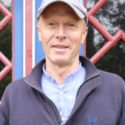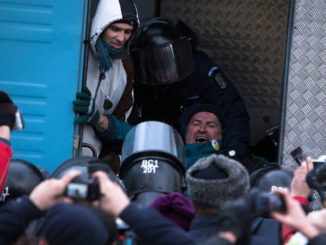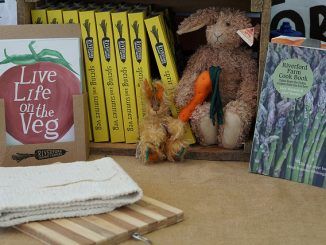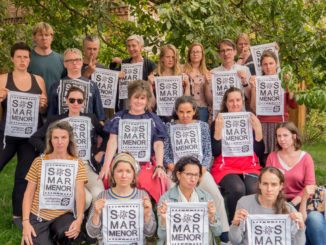Yiorgos Psychas is member of a grassroots network in Greece called Iliosporoi (sunflower seed) working towards social, political and ecological transition in rural and urban areas of Greece. He is agronomist and master in landscape architecture, enjoys making ceramics, lives in Athens and soon on the island of Evia – and has engaged in the movement “access to land” on a European level. ARC2020’s Hannes Lorenzen spoke with Yiorgos.
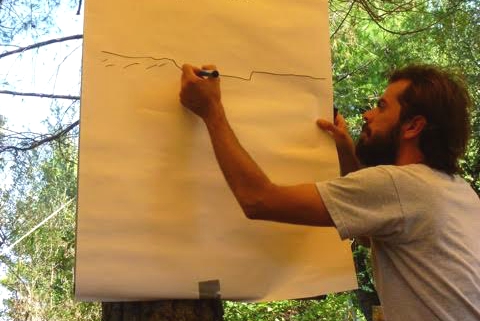
HL: How would you describe what Greece is currently going through?
YP I see it as an opportunity for leaving the errors and failures of our recent development behind. As virtually the entire economic and political system is under question this leaves room for new creativity and vision. During my studies in Denmark I have learned a lot about the social aspects of food, of how people can re-connect through food and farming in urban and rural societies and how important it is to improve our relations with nature. We all need to take a step back and get a more holistic approach of what we are doing to ourselves, to animals and plants.
HL: You spoke in Berlin at an international conference on access to land. Is land concentration and access to land a major problem in Greece?
YP Access to Land in Greece is a rather delicate issue that has not witnessed much attention from the public nor the grassroots’ movement in the past. Land ownership is still something like a sacred thing in Greece where private ownership, especially large estates remain unquestioned. Since the Ottoman Empire the Orthodox Church controlled much land which was then rented by smaller farmers. Since the crisis farmland is being increasingly accumulated by large farmers. Common land is being privatized with fast track procedures through the Hellenic Republic Asset Development Fund (TAIPED) or taken over by banks due to unpaid loans and then sold through actions usually by major bidders.

HL: Is there room for creativity and transition for grassroots movements?
YP Few activists and associations are involved in access to land issues. Most of the movement projects involve land reoccupation and creation of collective orchards in urban or suburban areas, instead of collective ownership and stewardship of land for farming purposes. As Iliosporoi network and CannaBio hemp cooperative, along with other collectives, we are considering the purchase of a 300 hectare land in Evia island and transform it into a productive hemp farm and green entrepreneurship hub.
HL: How do farmers and rural people look upon your initiatives?
YP We are regarded with a critical eye by rural people. We are mainly young activists from an urban environment with many different expectations, capacities and skills. What we are convinced about is that we cannot continue business as usual, not in economic, social or cultural terms. We have to fundamentally change our relations between us and with our environment. As an agronomist, landscape architect, ceramicist, and someone who believes in non-violent communication and in vegan nutrition I see the urgent need to change our daily life and our educational system, so that we can prepare transition towards resilient and sustainable lifestyles. We must question our food habits. 75% of farm production today is for industrial livestock with all its negative impact.
HL: What kind of education do you have in mind?
YP Children have to get in contact with real life again, with the basis of their existence and the challenges that lie before them. We need new curricula with very practical information on what we need to do to preserve and sustainably use our natural resources, living soil, water, energy and so on, prepare for climate change and incalculable weather, preserve local seeds and biodiversity and so on. We have support for this approach through the EU Erasmus plus program from which we got a top evaluation as “change makers” and we are representing Greece on the European Youth Week next May which focuses this year on solidarity and social commitment of young people in Europe. We hope that we can reconnect farmers and consumers, professionals and activists to form a collective transition process throughout Greece.
HL : You will be part of the organising group of European Rural Sustainability Gathering which will be organised in Karditsa, central Greece in May this year. What would you like to put in the focus of that gathering and what should come out of it?

YP: I believe that we will have an excellent opportunity to gather ideas from across Europe on how to deal with moments of crisis such as we have in Greece; to share our own problems and solutions from local initiatives to national attempts to use the moment for changing what needs to be changed. We will be working with professionals like the Karditsa development agency who have gathered much knowledge about social economy, with seeds savers like Peliti, with grassroots initiatives and hopefully many inspiring people who come to join us in Greece. 60% of all young people in Greece today are without jobs. 300.000 have already left our country. Poverty is growing fast.
We believe that change comes as a realization of the individual responsibility that can be reflected and supported through collective actions. We are not trying to change the world. We are trying to change ourselves. We are trying to learn how to listen, observe, feel and understand natural mechanisms. We want to support our empathy for one another. This is our immediate purpose.


